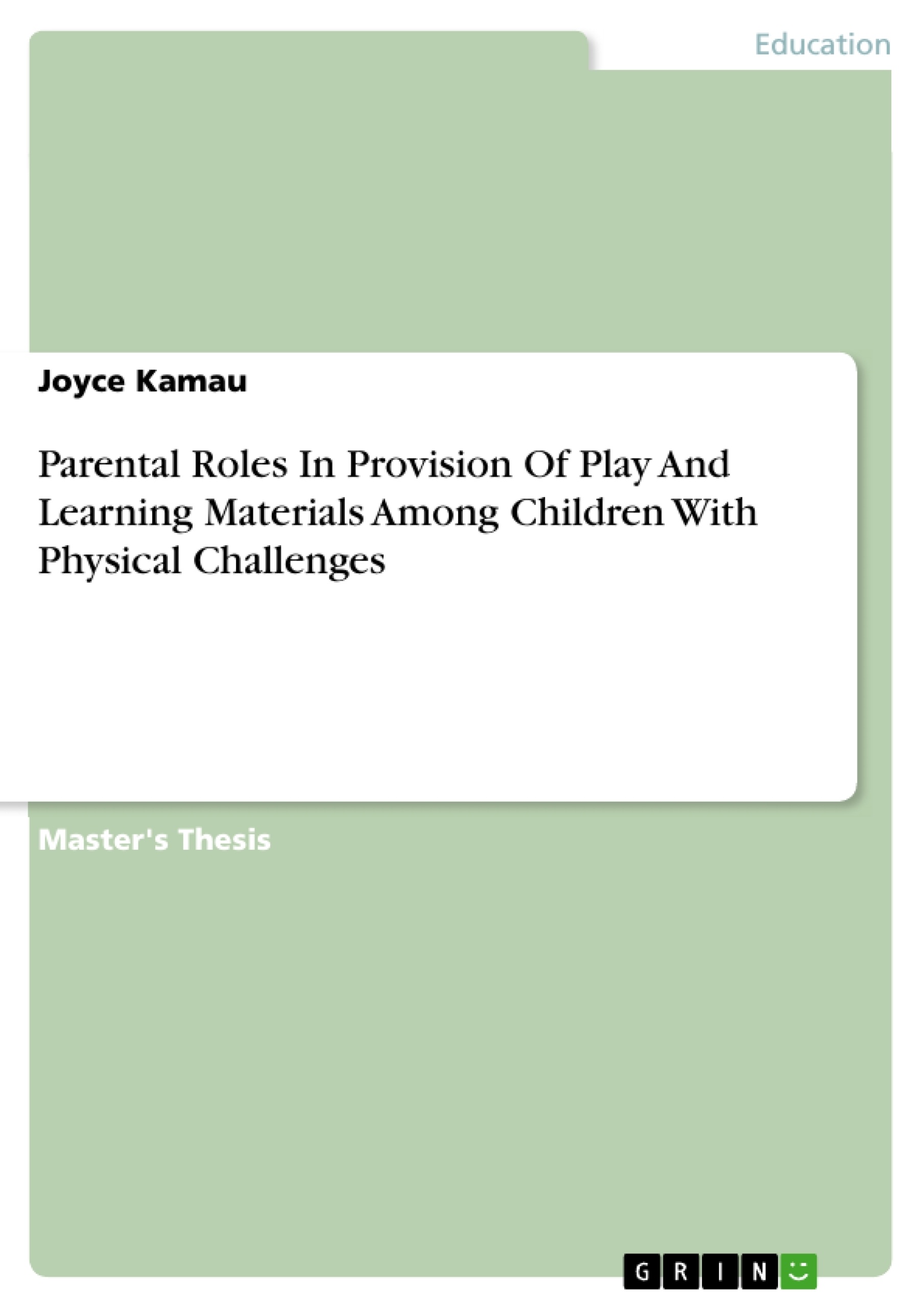The purpose of this study was to investigate the role of parents in the provision of play and learning materials to children with various physical challenges in the early childhood in a primary school for the physically challenged. The study established the role of parents and factors influencing their support in provision of play and learning materials.
In early childhood education play and learning are inseparable and they stimulate one another. There are dimensions of play in learning and dimension of play in learning. Several studies have proved that play especially during early years promotes learning and holistic development. However, play and learning for a child with physical challenges is not effortless a lot should be done by stakeholders involved in provision of play and learning materials.
Studies by Kamere (2004), Kimosop (2002) and Wamocho (2003) reveal that special schools do not have adequate play and learning materials however they did not investigate factors behind the inadequacies from parents’ point of view hence the need for the current study. Government, parents and other stakeholders have tried their best to cater for educational needs of children with physical challenges but the inadequacies persist.
Therefore, the study sought to establish role of parents in the provision of play and learning materials and the challenges they experience in provision of play and learning materials which are of key importance to these children. Also the study established activities that children engage in with play and learning materials provided to them.
Inhaltsverzeichnis (Table of Contents)
- Chapter 1: Introduction
- 1.1: Background to the study
- 1.2: Statement of the problem
- 1.3: Purpose of the study
- 1.4: Objectives of the study
- 1.5: Research questions
- 1.6: Significance of the study
- 1.7: Scope of the study
- 1.8: Limitations of the study
- 1.9: Definition of terms
- Chapter 2: Literature Review
- 2.1: The concept of play
- 2.2: The concept of learning materials
- 2.3: The role of parents in provision of play and learning materials
- 2.4: The role of teachers in provision of play and learning materials
- 2.5: The importance of play and learning materials for children with physical challenges
- Chapter 3: Research Methodology
- 3.1: Research design
- 3.2: Population of the study
- 3.3: Sampling procedures
- 3.4: Data collection instruments
- 3.5: Data collection procedures
- 3.6: Data analysis procedures
- Chapter 4: Presentation, Analysis and Interpretation of Data
- 4.1: Demographic characteristics of the respondents
- 4.2: Parents' involvement in provision of play and learning materials
- 4.3: Factors influencing parents' involvement in provision of play and learning materials
- 4.4: The impact of play and learning materials on children with physical challenges
- Chapter 5: Summary of Findings, Discussion, Conclusion and Recommendations
- 5.1: Summary of findings
- 5.2: Discussion of findings
- 5.3: Conclusion
- 5.4: Recommendations
- References
- Appendices
Zielsetzung und Themenschwerpunkte (Objectives and Key Themes)
This research investigates the role of parents in providing play and learning materials for children with physical challenges. The study seeks to establish parents' involvement in providing these materials and identify the factors that influence their support. The study focuses on Joytown Primary School for the Physically Challenged in Thika Town, Kenya.
- Parental involvement in provision of play and learning materials for children with physical challenges
- Factors influencing parents' support for their children's access to play and learning materials
- The impact of play and learning materials on the holistic development of children with physical challenges
- The role of teachers in supporting the provision of play and learning materials
- The challenges faced by children with physical challenges in accessing quality play and learning materials
Zusammenfassung der Kapitel (Chapter Summaries)
Chapter 1 introduces the background of the study, outlining the prevalence of physical challenges among children in Kenya and highlighting the challenges they face in accessing quality education. The chapter also defines the research problem, purpose, and objectives of the study.
Chapter 2 presents a comprehensive literature review on the concepts of play and learning materials, the role of parents and teachers in their provision, and the specific needs of children with physical challenges.
Chapter 3 outlines the research methodology employed, detailing the research design, population, sampling procedures, data collection instruments, data collection procedures, and data analysis methods.
Chapter 4 presents, analyzes, and interprets the collected data. This chapter examines demographic characteristics of the respondents, parents' involvement in the provision of play and learning materials, factors influencing parents' support, and the impact of play and learning materials on the children's holistic development.
Schlüsselwörter (Keywords)
This research focuses on parental involvement, play and learning materials, children with physical challenges, holistic development, and inclusive education. The study investigates the factors that influence parents' support for their children's access to appropriate learning materials and aims to shed light on the challenges faced by children with physical challenges in accessing quality education.
- Quote paper
- Joyce Kamau (Author), 2017, Parental Roles In Provision Of Play And Learning Materials Among Children With Physical Challenges, Munich, GRIN Verlag, https://www.grin.com/document/353166



